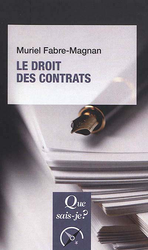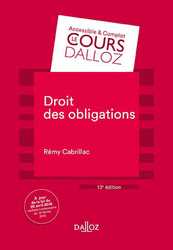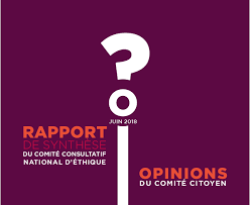The recent news
June 27, 2018
Blog

Muriel Fabre-Magnan vient de publier un Que Sais-Je sur Le Droit des contrats.
Il s'agit de rendre intelligible ce sujet où se sont accumulés tant de détails et tant de pages. Et cela est fait.
Par 5 mots qui forment les titres des 5 chapitres de l'ouvrage.
Et le lecteur relève l'absence d'un mot dont pourtant l'on souligne l'importance dans tant d'écrits et de discours : le "consentement". Comme Muriel Fabre-Magnan a raison.
I. LES 5 MOTS PAR LESQUELS MURIEL FABRE-MAGNAN RENDE COMPTE DU DROIT DES CONTRATS
La liberté. C'est le principe premier. L'auteur le rappelle.
La volonté.
L'obligation.
La loi.
La justice.
II. LE MOT QUE MURIEL FABRE-MAGNAN PREND SOIN DE TAIRE : LE "CONSENTEMENT
June 27, 2018
Publications

Référence complète : Frison-Roche, M.-A., Le Juge, le Régulateur et le Droit, in L'ENA hors les murs, Le droit et la justice aujourd'hui. Et demain ?, n°481, 2018, pp.72-73.
Résumé. Du Juge, du Régulateur et du Droit, c'est plutôt le "Régulateur" qui vient en premier, mais cette prééminence vint parfois sur ordre du juge plutôt que sur décision autonome de l'État, même s'il s'avère que c'est toujours, voire avant tout, pour fonder une relation de confiance qu'un Régulateur est établi (I). Institué, le Régulateur doit se comporter dans ses pouvoirs ex post comme un Juge (II). Lorsque le Régulateur est en contact avec les juges, rapport obligé puisque que le Régulateur est soumis au Droit, l'entente est plus ou moins cordiale (III) et c'est la tension des relations entre Droit et Économie qui transparaît alors. Mais l'Europe est l'espace où les conciliations se font plus aisément, notamment grâce à la puissance et l'autorité de ses Juges, comme le montre l'Union bancaire (IV). La mondialisation ayant rebattu la carte des puissances et des dangers, les prétentions du Droit sont aujourd'hui internalisées dans les entreprises mêmes : le Droit de la Régulation se transforme en Droit de la Compliance, par lequel l'"entreprise cruciale" devient une structure qui juge et applique , y compris à elle-même, des normes mondiales pour atteindre des "buts monumentaux" exprimés par les États (V). En cela la "lutte pour le Droit" pourrait se faire dans un nouveau jeu entre les entreprises, les Juges et les Régulateurs.
Cet article s'appuie sur un document de travail.
Celui est doté de notes de bas de pages, de références techniques et de liens hypertextes.
Il est accessible en langue française par le lien suivant : Le Juge, le Régulateur et le Droit.
Il est accessible en langue anglaise par le lien suivant : The Judge, the Regulator and the Law.
June 27, 2018
Blog

Dans la Collection Cours (Série Droit Privé), je demande le Droit des obligations !
Aussitôt demandé, aussitôt servi !
En effet, la 13ième édition de ce manuel est disponible.
En 500 pages aérées et peu alourdies des seules notes de bas de pages nécessaires, c'est classiquement que le Droit des obligations est exposé.
En effet la réforme de cette branche du droit opérée en 2016 et validée en 2018 est avant tout cela : classique.
C'est pourquoi il convient d'exposer tout d'abord les sources et ensuite le régime.
Dans les sources, le lecteur doit passer successivement des actes juridiques, aux quasi-contrats (qui prennent de plus en plus d'importance) pour finir vers la responsabilité civile extra-contractuelle.
Les obligations ne vivant que par leur exécution, la compréhension du "régime" conduit le lecteur des modalités des obligations, à la circulation de celles-ci, pour finir vers leur extension.
Car qui ne rêve en matière d'obligations que celles-ci finissent par s'éteindre ....
Ainsi, en peu de pages, classiquement - et donc sobrement - écrites, l'on peut s'y retrouver dans un Droit qui a le grand mérite de prétendre garder ses lignes.
_________
June 21, 2018
Blog

June 12, 2018
Blog

Comme un professeur faisant une synthèse d'un colloque, le Comité d'Ethique a publié le 1ier juin 2018 une synthèse des débats qu'il a organisés autour de la prochaine révision des lois de bioéthiques.
Dans un rapport très bien écrit, on y trouve toute la rhétorique professionnelle. Il précise que cette synthèse ne constitue pas un avis, qu'il y est parfaitement "impartial" et "objectif". Il donnera son avis en septembre, pour l'instant il laisse la parole aux autres. C'est ainsi qu'il peut émettre son opinion dès maintenant sans qu'on puisse en débattre puisqu'il se contente de faire un "rapport de synthèse".
La méthodologie est exposée, faisant référence à l'éthique de la discussion, des experts ayant été chargés de veiller à la "neutralité du propos" (p.7).
L'exercice de synthèse est très clairement mené, même s'il semble que la rédaction n'ait pas été menée par la même main suivant le thème, le style différant suivant les chapitres. En revanche le traitement est toujours le même. Pauvre Droit. Il est toujourst ramené à être le "cadre légal et réglementaire". Cela ne serait que cela le Droit : un ensemble de textes, et rien d'autre. Et effectivement ne sont mentionnés que les lois et les articles des différents Codes applicables. Il est certain qu'ainsi c'est plus clair. Mais c'est aussi si faux : même les non-juristes se doutent que le Droit s'exprime par des principes qui ont été le plus souvent édictés par des grandes décisions de justice. La description par exemple du Droit applicable aux données de santé est si rétrécie par cette réduction à un "cadre légal et réglementaire.
Les définitions sont d'ailleurs souvent tautologiques. Par exemple, qu'est-ce qu'un "consentement" ? Il est vrai que la question est très difficile et qu'il est difficile de définir "objectivement" le consentement. L'on comprend donc pourquoi le consentement est défini dans ele glossaire comme é ant un consentement (p.84): Consentement : dans le cadre médical, toute personne doit être présumée capable a priori de recevoir des informations et de donner un consentement "libre et éclairé" à un acte médical qu'on lui propose, à moins qu'il n’ait été établi que cette capacité lui faisait défaut. L'information doit être « loyale, claire et appropriée ». Il faut pouvoir comprendre (clarté de l'entendement ou intellect) et pouvoir se déterminer librement (autonomie de la volonté).". On ne peut pas définir une notion par ses attributs (libre et éclairé). L'on ne sait donc pas ce qu'est un "consentement". Mais l'on ne peut pas en faire reproche au CNCE, car il est vrai que c'est une notion si difficile à appréhender.
Pour ne prendre que la fiche consacrée au thème "Procréation et société", dont le CNCE souligne dans son introduction qu'il ne relève pas de la bioéthique, affirmation que pour ma part je n'ai pas compris car la filiation me semblait au coeur même de la bioéthique.
Sur la GPA, la question est correctement retranscrite. Elle l'est dans ces termes :
" La crainte qu’une évolution législative sur l’AMP n’ouvre la voie à la gestation pour autrui en raison d’une revendication d’égalité de traitement des couples d’hommes est récurrente. Certains participants défendent le fait que des mères porteuses peuvent s’inscrire dans une démarche véritablement altruiste. Pour d’autres, c’est toujours une marchandisation, voire un esclavage et, en outre, elle induit un risque d’effets psychiques délétères sur celle qui porte l’enfant et également ultérieurement sur l’enfant lui-même quant à son origine qui a nécessité une gestation par une autre femme que sa mère d’intention. Le risque d’eugénisme et d’avoir « un enfant sur catalogue » est également mentionné. Dans certains débats, la greffe d’utérus pour les femmes qui en sont Page 110 dépourvues est jugée préférable à la GPA. Concernant les enfants nés par GPA à l’étranger, la régularisation à l’état civil français des enfants déjà nés est demandée par certains, de même qu’une sanction pénale des parents ayant eu recours à des mères porteuses est réclamée par des participants. "
De la même façon, les "pistes de discussion" (p.116-117) sont clairement restituées. La conclusion est neutre : "2. La possibilité d’autoriser le recours à une GPA est rejetée de façon massive lorsqu’il s’agit d’une demande sociétale ; la crainte répétée est qu’une ouverture de l’AMP entraîne inéluctablement l’autorisation de la GPA. La possibilité qu’une gestation pour autrui puisse offrir une réponse dans certaines indications médicales exceptionnelles a été soulevée. Le souhait qu’une réflexion collective sereine sur le sujet puisse être organisée était bien présent.(p.125).
C'est d'une façon plus étonnante que sont mentionnés comme étant "Les points de droit" la question suivante : "Une interrogation exprimée est celle de la difficulté de légiférer sur un droit aussi intime que celui qui touche à la procréation, et le manque de critères pour le faire. Certains ont souligné que l’infertilité, quelle qu’en soit l’origine, avait un impact au-delà du couple, sur l’ensemble de la famille. ".
Réduire à cela les "points de droit", alors que l'ensemble remet en cause tout le droit : non seulement toute la filiation - qui est le socle des structures sociales - mais encore le statut de la Personne - qui est ce pourquoi le Droit a été institué, empêché qu'elle soit engendré afin d'être cédé, c'est montrer qu'il y a une incompréhension de ce qu'est le Droit.
Or, dans ces questions où le désir, la technique et la rencontre de l'offre et de la demande fluidifiée par la capacité financière des uns et le besoin d'argent des autres sont naturellement à l'oeuvre, n'est-ce pas une bonne compréhension du Droit, et non pas du "cadre légal et réglementaire" qui est requis ?

June 7, 2018
Publications

L'on semble bien obnubilé par le "RGPD"... Que l'on étudie virgule après virgule. Cela se comprend puisqu'il faut bien des modes d'emploi.
Il convient aussi de regarder ce qui a constitué son terrain et son contexte, avant de comprendre de quoi ce Règlement est porteur.
Pour le comprendre, il faut sans doute regarder certains détails, certains mots (sa "lettre"), son but (son "esprit"). D'ailleurs,classiquement en Droit dans le Code civil il est rappelé que pour connaître l'esprit d'un texte il faut partir de sa lettre, c'est-à-dire de ses mots. Et là, l'on est bien ennuyé pour que nous ne parlons que par sigles : RGPD, RGPD ... Mais ce sigle est-il même exact ? Est-ce là le titre du Règlement de 2016 ? Non. Le juriste, qu'il soit européen ou américain, de Civil Law ou de Common Law, ne lit pas les commentaires : il lit les textes, les lois et les jurisprudences. Il cherche les définitions et les qualifications. Il replace les mots qui se saisissent des réalités dans l'ensemble : par exemple : la "donnée". Il en cherche la définition. Qui définit ce qu'est une "donnée" ?
Puis il prend une perspective. Non pas parce qu'il est un bel esprit, qui aime les perspective. Non, le juriste est plutôt un esprit besogneux, assez plat. La perspective vient de la matière. Mais on sommes en "Droit économique". Et même en "Droit de la régulation". Or, dans ces matières-là, il n'est pas contesté que la "norme", le principe, celui qui donne un sens aux définitions, aux qualifications, aux règles techniques, qui donnent des solutions aux cas non prévus par le texte, est dans le but poursuivi par les dispositions : c'est un Droit de nature "téléologique".
Quel est le but du "RGPD". Il suffit de lire le titre de ce Règlement. Cela est bien difficile, puisqu'un sigle l'a désormais recouvert ... Mais ce règlement du 27 avril 2016 est relatif à la protection des personnes physiques à l'égard du traitement des données à caractère personnel et à la libre circulation de ces données
Il a donc deux buts : la protection des personnes ; la circulation des données.
Il faut donc poser que le but du Règlement est la construction de l'Europe numérique, sur le principe de circulation des données, principe libéral classique qui construit un espace par la dynamique de la circulation : c'est la perspective de l'Europe numérique qui anime le Règlement (I). Pour ce faire, quelle est la nouveauté du système ? Elle tient en une seule chose. Car le Parlement français a insisté sur le fait que la nouvelle loi de transposition adoptée le 17 mai 2018 vient modifier la loi informatique et Libertés de 1978 sans la remplacer. La nouveauté tient dans le fait que ce ne sont plus les Autorités publiques, nationales ou de l'Union qui sont en charge de l'effectivité du dispositif, mais les entreprises elles-mêmes : la Régulation digitale (qui demeure publique) a été internalisée dans les entreprises. Il s'agit désormais d'un mécanisme de "Compliance". En cela, le "RGDP" est non seulement le bastion avancé de l'Europe numérique, mais encore le bastion avancé de "l''Europe de la Compliance". Celle-ci a un grand avenir, notamment vis-à-vis des Etats-Unis, et les entreprises y ont un rôle majeur. Le numérique n'en est qu'un exemple, le Droit européen de la Compliance étant en train de se mettre en place.
Updated: June 6, 2018 (Initial publication: March 2, 2018)
Blog

Quand on lit la décision rendue aujourd'hui, 2 mars 2018, par le Conseil constitutionnel sur QPC, Ousmane K., l'on peut être étonné par la brièveté de la motivation au regard de l'ampleur de la portée de la décision.
Ampleur de la décision qui sera confirmée par l'arrêt rendu le 30 mai par la Chambre criminelle de la Cour de cassation, Paul X, qui modifie en conséquence sa jurisprudence sur la non-obligation de motiver les peines contraventionnelles pour imposer le principe inverse, dans la lignée de la présente décision, en raison de son caractère très général.
En effet, dans le principe de la non-motivation des arrêts de Cour d'assises avait déjà été remis en cause par la décision du Conseil constitutionnel rendu sur QPC le 1ier avril 2011, Mastor, qui avait posé que si la Constitution ne conférait pas à l'obligation juridictionnelle de motiver un caractère général et absolu, il fallait que cela ne confine pas à l'arbitraire.
Il en avait résulté une modification du Code de procédure pénale. Mais celles-ci ne visent que le prononcé de la culpabilité des personnes accusées et c'est en des termes très généraux que le Conseil s'exprime pour atteindre les conditions du prononcé de la peine :
"Il ressort des articles 7, 8 et 9 de la Déclaration des droits de l'homme et du citoyen de 1789 qu'il appartient au législateur, dans l'exercice de sa compétence, de fixer des règles de droit pénal et de procédure pénale de nature à exclure l'arbitraire dans la recherche des auteurs d'infractions, le jugement des personnes poursuivies ainsi que dans le prononcé et l'exécution des peines. Le principe d'individualisation des peines, qui découle de l'article 8 de cette déclaration, implique qu'une sanction pénale ne puisse être appliquée que si le juge l'a expressément prononcée, en tenant compte des circonstances propres à chaque espèce. Ces exigences constitutionnelles imposent la motivation des jugements et arrêts de condamnation, pour la culpabilité comme pour la peine.
En application de l'article 365-1 du code de procédure pénale, le président ou l'un des magistrats assesseurs désigné par lui doit rédiger la motivation de l'arrêt rendu par la cour d'assises. Selon le deuxième alinéa de cet article, en cas de condamnation, la motivation doit comprendre l'énoncé des principaux éléments à charge qui, pour chacun des faits reprochés à l'accusé, ont convaincu la cour d'assises au terme des délibérations sur la culpabilité. En revanche, il résulte de la jurisprudence constante de la Cour de cassation que l'article 365-1 du code de procédure pénale interdit la motivation par la cour d'assises de la peine qu'elle prononce.
En n'imposant pas à la cour d'assises de motiver le choix de la peine, le législateur a méconnu les exigences tirées des articles 7, 8 et 9 de la Déclaration de 1789. Par suite, et sans qu'il soit besoin d'examiner les autres griefs, le deuxième alinéa de l'article 365-1 du code de procédure pénale doit être déclaré contraire à la Constitution.".
____
Ce qui est remarquable, c'est le caractère elliptique de la motivation du Conseil constitutionnel, qui n'explicite pas pourquoi il est constitutionnellement nécessaire de motiver, alors qu'il explicite la source de sa contrariété, à savoir la jurisprudence de la Cour de cassation, qui se refuse à elle-même utiliser les principes généraux pour imposer une obligation de motiver dans le prononcé des peines !
En premier lieu, le Conseil constitutionnel qui depuis longtemps élabore un Droit constitutionnel répressif non seulement double le contentieux pénal mais ici le contre et écrit qu'il le fait parce qu'en quelque sorte, dans son esprit, la jurisprudence judiciaire ne fait pas son travail ....
En deuxième lieu, le Conseil constitutionnel aurait pu davantage expliciter pourquoi le principe de motivation est si important qu'il faut tout briser, non seulement le silence du Législateur mais encore la jurisprudence expresse de la jurisprudence, et qui plus est la jurisprudence qui est à priori la mieux placée en matière pénale, à savoir la jurisprudence pénale. C'est regrettable. Cela résulte donc tout à la fois des exigences de nature "négative" de lutte contre l'arbitraire et des exigences de nature "positive" d'individualisation des peines.
En troisième lieu, ce principe s'applique non seulement au "droit pénal" mais à toute la "matière pénale", notamment à tout le droit économique répressif. Ce qui implique de regarder dans tous les dispositif d'ordre public de direction ce qui peut heurter un tel principe.
_____
June 6, 2018
Thesaurus : Doctrine
► Référence complète : R. Pisillo Mazzechi, "Le chemin étrange de la due diligence : d'un concept mystérieux à un concept surévalué", in S. Cassella dir.), Le standard de due diligence et la responsabilité internationale, Pedone, 2018.
____